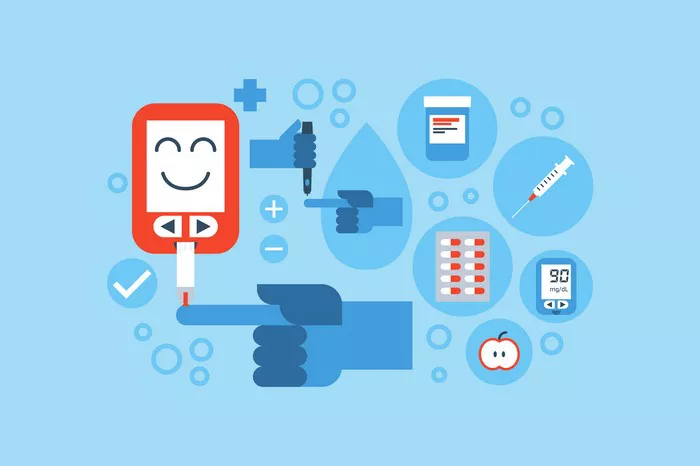Type 1 diabetes (T1D) is a chronic autoimmune condition characterized by the destruction of insulin-producing beta cells in the pancreas, leading to an absolute insulin deficiency and dysregulation of blood glucose levels. Managing T1D requires a multifaceted approach that encompasses insulin therapy, blood glucose monitoring, dietary interventions, physical activity, and psychosocial support. In this comprehensive article, we explore the various components of T1D treatment, discuss emerging therapies and innovations, and address the challenges associated with managing this complex condition.
1. Insulin Therapy:
Insulin therapy is the cornerstone of T1D management, as individuals with T1D require exogenous insulin to regulate blood glucose levels and prevent complications. Multiple insulin formulations are available, each with distinct onset, peak, and duration of action:
- Rapid-acting insulin analogs: Administered before meals to control postprandial glucose spikes. Examples include insulin lispro, insulin aspart, and insulin glulisine.
- Short-acting insulin: Administered 30 minutes to an hour before meals. Regular human insulin is a common short-acting insulin formulation.
- Intermediate-acting insulin: Provides basal insulin coverage and helps control blood glucose levels between meals and overnight. NPH (neutral protamine Hagedorn) insulin is an intermediate-acting insulin.
- Long-acting insulin analogs: Provides basal insulin coverage with a relatively flat action profile, helping maintain stable blood glucose levels throughout the day and night. Examples include insulin glargine and insulin detemir.
Individuals with T1D often use a combination of short-acting or rapid-acting insulin before meals and long-acting insulin for basal coverage. Insulin therapy may be delivered via multiple daily injections or continuous subcutaneous insulin infusion (insulin pump therapy), depending on individual preferences, lifestyle, and treatment goals.
2. Blood Glucose Monitoring:
Regular monitoring of blood glucose levels is essential for assessing glycemic control, adjusting insulin doses, and preventing acute and chronic complications. Several blood glucose monitoring methods are available, including:
- Self-monitoring of blood glucose (SMBG): Involves using a glucometer to measure blood glucose levels using a fingerstick blood sample. SMBG allows individuals to monitor their blood glucose levels at home and make real-time adjustments to their insulin therapy, diet, and physical activity.
- Continuous glucose monitoring (CGM): Utilizes a small sensor inserted under the skin to continuously measure interstitial glucose levels. CGM systems provide real-time glucose readings, trend data, and alerts for hypo- and hyperglycemia, enabling individuals to make informed decisions about their diabetes management.
CGM technology has revolutionized diabetes care by providing individuals with greater insights into their glucose patterns and helping optimize glycemic control while reducing the risk of hypoglycemia.
3. Carbohydrate Counting and Meal Planning:
Dietary interventions play a crucial role in T1D management, as carbohydrate intake directly affects blood glucose levels. Carbohydrate counting is a dietary strategy that involves estimating the amount of carbohydrates in meals and matching insulin doses accordingly. By calculating insulin-to-carbohydrate ratios and correction factors, individuals can customize their insulin doses to cover the carbohydrates consumed and correct for any deviations from target blood glucose levels.
In addition to carbohydrate counting, meal planning for individuals with T1D emphasizes a balanced diet rich in fruits, vegetables, whole grains, lean protein, and healthy fats. Portion control, timing of meals, and glycemic index/load considerations are important factors in optimizing postprandial glucose control and preventing glucose fluctuations.
4. Physical Activity and Exercise:
Regular physical activity is beneficial for individuals with T1D as it improves insulin sensitivity, enhances cardiovascular health, and helps manage weight. Exercise can also lower blood glucose levels and reduce the risk of hyperglycemia during and after physical activity. However, exercise can also increase the risk of hypoglycemia, particularly if insulin doses or carbohydrate intake are not adjusted accordingly.
To minimize the risk of hypoglycemia during exercise, individuals with T1D should monitor their blood glucose levels before, during, and after physical activity, consume carbohydrates as needed, and adjust insulin doses or basal rates on insulin pumps as necessary. Additionally, staying hydrated and carrying fast-acting carbohydrates (such as glucose tablets or gels) during exercise can help address hypoglycemic episodes.
5. Psychosocial Support and Diabetes Education:
Living with T1D can have a significant psychosocial impact on individuals and their families, requiring ongoing support and education to cope with the challenges of the condition. Diabetes education programs provide essential information on insulin therapy, blood glucose monitoring, carbohydrate counting, meal planning, exercise, and stress management.
Psychosocial support services, such as individual counseling, support groups, and peer mentorship programs, offer opportunities for individuals to share experiences, receive emotional support, and learn coping strategies. Addressing the emotional and psychological aspects of T1D is crucial for promoting mental well-being, treatment adherence, and overall quality of life.
6. Emerging Therapies and Innovations:
In recent years, there have been significant advancements in T1D treatment and management, including the development of novel therapies and technologies aimed at improving glycemic control, reducing the burden of self-management, and enhancing quality of life. Some of the emerging therapies and innovations in T1D management include:
- Closed-loop insulin delivery systems (artificial pancreas): Automated insulin delivery systems that combine continuous glucose monitoring with insulin pump therapy to adjust insulin doses in real-time based on glucose trends. Closed-loop systems have been shown to improve glycemic control, reduce hypoglycemia, and enhance quality of life for individuals with T1D.
- Sensor-augmented pump therapy: Combines continuous glucose monitoring with insulin pump therapy to provide real-time glucose readings, trend data, and predictive alerts for hypo- and hyperglycemia. Sensor-augmented pump therapy helps individuals optimize insulin dosing and improve glycemic control while reducing the risk of hypoglycemia.
- Novel insulin formulations: Researchers are exploring new insulin formulations with improved pharmacokinetic profiles, such as ultra-rapid-acting insulins and stable, longer-acting insulins. These innovations aim to mimic physiological insulin secretion, provide more predictable glucose-lowering effects, and simplify insulin dosing regimens for individuals with T1D.
Additionally, advances in stem cell research, immunotherapy, and regenerative medicine hold promise for potential cures or disease-modifying treatments for T1D in the future. Clinical trials and research studies are ongoing to evaluate the safety, efficacy, and long-term outcomes of these innovative approaches in T1D management.
7. Challenges in T1D Treatment:
Despite the progress in T1D treatment and management, several challenges persist, impacting individuals, healthcare providers, and healthcare systems. Some of the key challenges in T1D treatment include:
- Access to care: Disparities in access to healthcare services, insulin, and diabetes supplies can hinder optimal T1D management, particularly in low-income and underserved communities. Addressing barriers to care and improving healthcare access are essential for reducing health disparities and improving outcomes for individuals with T1D.
- Cost of insulin and diabetes supplies: The rising cost of insulin and diabetes supplies poses a significant financial burden for individuals with T1D and their families, leading to medication non-adherence and suboptimal glycemic control. Policy interventions, such as price regulation, insurance coverage mandates, and patient assistance programs, are needed to ensure affordable access to essential diabetes medications and supplies.
- Psychosocial factors: The emotional and psychological impact of living with T1D, including diabetes distress, depression, anxiety, and burnout, can affect treatment adherence, self-care behaviors, and overall quality of life. Integrating psychosocial support services into routine diabetes care and addressing the mental health needs of individuals with T1D are critical for promoting holistic well-being and treatment success.
- Technological barriers: While advances in diabetes technology have transformed T1D management, barriers such as cost, complexity, and usability limitations may prevent widespread adoption and utilization of these innovations. Improving the affordability, accessibility, and user-friendliness of diabetes technology is essential for maximizing its potential benefits and empowering individuals with T1D to better manage their condition.
8. Conclusion:
In conclusion, the treatment of type 1 diabetes requires a comprehensive and multidisciplinary approach that addresses the complex interplay of physiological, behavioral, and psychosocial factors. Insulin therapy, blood glucose monitoring, dietary interventions, physical activity, and psychosocial support are essential components of T1D management, aimed at achieving optimal glycemic control, preventing complications, and enhancing quality of life.
Emerging therapies and innovations in T1D management, such as closed-loop insulin delivery systems, sensor-augmented pump therapy, and novel insulin formulations, hold promise for improving outcomes and transforming the lives of individuals with T1D. However, addressing challenges such as access to care, cost of treatment, psychosocial factors, and technological barriers is essential for ensuring equitable and effective T1D management for all.
By advocating for policies that support affordable access to insulin and diabetes supplies, investing in research and innovation, and fostering collaborative efforts among stakeholders, we can work towards a future where every individual with type 1 diabetes has the resources, support, and tools they need to live healthy, fulfilling lives.



























